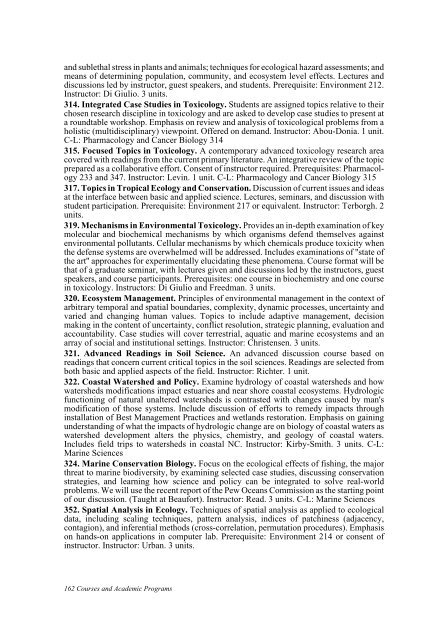2005-06 - Office of the Registrar - Duke University
2005-06 - Office of the Registrar - Duke University
2005-06 - Office of the Registrar - Duke University
Create successful ePaper yourself
Turn your PDF publications into a flip-book with our unique Google optimized e-Paper software.
and sublethal stress in plants and animals; techniques for ecological hazard assessments; and<br />
means <strong>of</strong> determining population, community, and ecosystem level effects. Lectures and<br />
discussions led by instructor, guest speakers, and students. Prerequisite: Environment 212.<br />
Instructor: Di Giulio. 3 units.<br />
314. Integrated Case Studies in Toxicology. Students are assigned topics relative to <strong>the</strong>ir<br />
chosen research discipline in toxicology and are asked to develop case studies to present at<br />
a roundtable workshop. Emphasis on review and analysis <strong>of</strong> toxicological problems from a<br />
holistic (multidisciplinary) viewpoint. Offered on demand. Instructor: Abou-Donia. 1 unit.<br />
C-L: Pharmacology and Cancer Biology 314<br />
315. Focused Topics in Toxicology. A contemporary advanced toxicology research area<br />
covered with readings from <strong>the</strong> current primary literature. An integrative review <strong>of</strong> <strong>the</strong> topic<br />
prepared as a collaborative effort. Consent <strong>of</strong> instructor required. Prerequisites: Pharmacology<br />
233 and 347. Instructor: Levin. 1 unit. C-L: Pharmacology and Cancer Biology 315<br />
317. Topics in Tropical Ecology and Conservation. Discussion <strong>of</strong> current issues and ideas<br />
at <strong>the</strong> interface between basic and applied science. Lectures, seminars, and discussion with<br />
student participation. Prerequisite: Environment 217 or equivalent. Instructor: Terborgh. 2<br />
units.<br />
319. Mechanisms in Environmental Toxicology. Provides an in-depth examination <strong>of</strong> key<br />
molecular and biochemical mechanisms by which organisms defend <strong>the</strong>mselves against<br />
environmental pollutants. Cellular mechanisms by which chemicals produce toxicity when<br />
<strong>the</strong> defense systems are overwhelmed will be addressed. Includes examinations <strong>of</strong> ''state <strong>of</strong><br />
<strong>the</strong> art'' approaches for experimentally elucidating <strong>the</strong>se phenomena. Course format will be<br />
that <strong>of</strong> a graduate seminar, with lectures given and discussions led by <strong>the</strong> instructors, guest<br />
speakers, and course participants. Prerequisites: one course in biochemistry and one course<br />
in toxicology. Instructors: Di Giulio and Freedman. 3 units.<br />
320. Ecosystem Management. Principles <strong>of</strong> environmental management in <strong>the</strong> context <strong>of</strong><br />
arbitrary temporal and spatial boundaries, complexity, dynamic processes, uncertainty and<br />
varied and changing human values. Topics to include adaptive management, decision<br />
making in <strong>the</strong> content <strong>of</strong> uncertainty, conflict resolution, strategic planning, evaluation and<br />
accountability. Case studies will cover terrestrial, aquatic and marine ecosystems and an<br />
array <strong>of</strong> social and institutional settings. Instructor: Christensen. 3 units.<br />
321. Advanced Readings in Soil Science. An advanced discussion course based on<br />
readings that concern current critical topics in <strong>the</strong> soil sciences. Readings are selected from<br />
both basic and applied aspects <strong>of</strong> <strong>the</strong> field. Instructor: Richter. 1 unit.<br />
322. Coastal Watershed and Policy. Examine hydrology <strong>of</strong> coastal watersheds and how<br />
watersheds modifications impact estuaries and near shore coastal ecosystems. Hydrologic<br />
functioning <strong>of</strong> natural unaltered watersheds is contrasted with changes caused by man's<br />
modification <strong>of</strong> those systems. Include discussion <strong>of</strong> efforts to remedy impacts through<br />
installation <strong>of</strong> Best Management Practices and wetlands restoration. Emphasis on gaining<br />
understanding <strong>of</strong> what <strong>the</strong> impacts <strong>of</strong> hydrologic change are on biology <strong>of</strong> coastal waters as<br />
watershed development alters <strong>the</strong> physics, chemistry, and geology <strong>of</strong> coastal waters.<br />
Includes field trips to watersheds in coastal NC. Instructor: Kirby-Smith. 3 units. C-L:<br />
Marine Sciences<br />
324. Marine Conservation Biology. Focus on <strong>the</strong> ecological effects <strong>of</strong> fishing, <strong>the</strong> major<br />
threat to marine biodiversity, by examining selected case studies, discussing conservation<br />
strategies, and learning how science and policy can be integrated to solve real-world<br />
problems. We will use <strong>the</strong> recent report <strong>of</strong> <strong>the</strong> Pew Oceans Commission as <strong>the</strong> starting point<br />
<strong>of</strong> our discussion. (Taught at Beaufort). Instructor: Read. 3 units. C-L: Marine Sciences<br />
352. Spatial Analysis in Ecology. Techniques <strong>of</strong> spatial analysis as applied to ecological<br />
data, including scaling techniques, pattern analysis, indices <strong>of</strong> patchiness (adjacency,<br />
contagion), and inferential methods (cross-correlation, permutation procedures). Emphasis<br />
on hands-on applications in computer lab. Prerequisite: Environment 214 or consent <strong>of</strong><br />
instructor. Instructor: Urban. 3 units.<br />
162 Courses and Academic Programs









